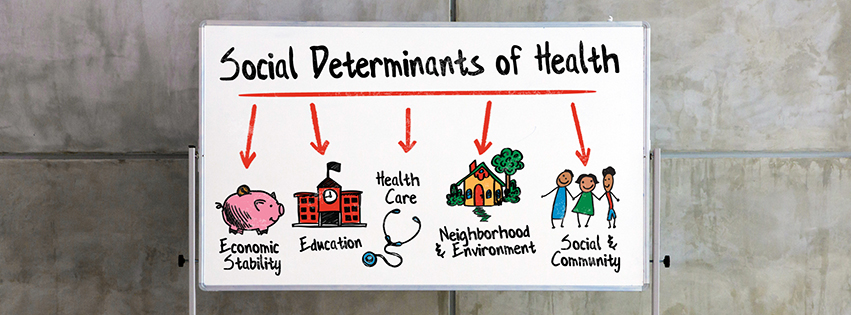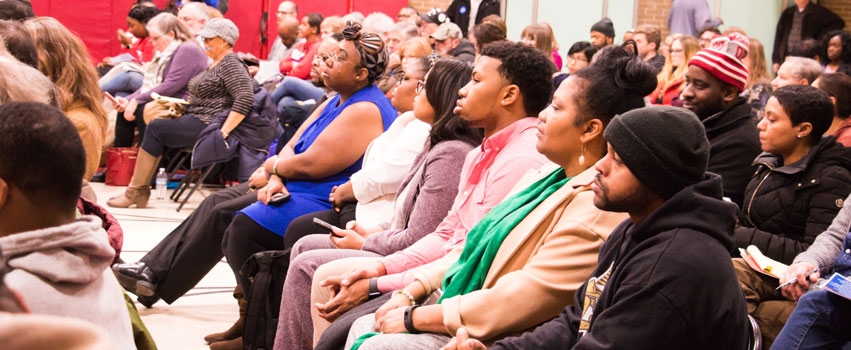The Interconnected Social Determinants of Health

Our personal health and the overall wellbeing of our community start in our homes, schools and neighborhoods. Throughout our lives and even before we are born, our health outcomes are continually impacted by socio-economic conditions.
Every one of us is impacted by social determinants of health in one way or another. Our education, economic stability, healthcare, environment and social networks are the building blocks needed to form a solid, often complex foundation that is fundamental to leading healthy lives.
But if just one building block is unstable or missing, our ability to successfully grow, live, work and age is hindered. The interconnectedness among social determinants of health can create a constant feedback loop, according to the World Health Organization: “Poor health or lack of education can impact employment opportunities, which in turn constrain income; low income reduces access to healthcare and nutritious food; and hardship causes stress, which in turn promotes unhealthy coping mechanisms.”
Together, our health and human care agencies, government organizations, schools, churches and other community stakeholders collaborate day in and day out to build a vital network of services that helps individuals bridge the gaps in their daily lives that ultimately impact their health.
To better connect individuals with unmet needs to these services, the Heart of Illinois United Way, in partnership with Advanced Medical Transport of Central Illinois, launched the Heart of Illinois 2-1-1 Information and Referral System in 2013. Whether connecting people to food, housing and utility assistance, or helping the community cope with crises such as natural disasters, economic downturns and public health issues, 2-1-1 is available 24/7 to ensure those in need know where to turn for help.
Connecting the Dots in Healthcare
Many healthcare providers are familiar with the upstream/downstream parable. At some point, you cannot only stay downstream saving people from drowning—you must look upstream to find opportunities to intervene and foster healthier lifestyles for their patients.
In 2019, OSF HealthCare launched Screen and Connect, a primary care digital screening program that treats the patient’s social determinants of health as a vital sign. Research over the past decade indicates as much as 80 percent of a person’s modifiable health is impacted by external factors. By identifying and addressing a patient’s social determinants of health in tandem with medical care, OSF providers are taking a holistic view to enhance patient care.
“Instead of just asking about medications or clinical needs, our providers are now able to think about what else needs to be addressed to optimize the whole health of that individual or family,” explains Dr. Sarah Stewart de Ramirez, OSF vice president and chief medical officer of clinical innovation. “We’ve also used this process to digitally enable community health workers to reach outside the walls of the hospitals and serve the community.”
Once a patient is identified as needing additional support outside the exam room or hospital, OSF HealthCare partners with the trained staff and comprehensive database at Heart of Illinois 2-1-1 to connect patients to services in their communities. “Vulnerable populations exist everywhere,” Dr. Ramirez adds. “The innovating work we are doing to address the social needs of patients alongside their medical needs allows us to care for patients using a variety of digital technologies—such as the Heart of Illinois 2-1-1 database.”
Collaborations Are Vital During Crises
Last year, calls to Heart of Illinois 2-1-1 increased more than 200 percent as the public health crisis and subsequent economic downturn affected thousands of lives in central Illinois. Throughout this entire process—from adding nurses to the call center staff last spring to answer COVID-19 questions, to assisting the health department with First Dose Saver calls this spring—Heart of Illinois 2-1-1 has been at the forefront of helping people cope with the effects of COVID-19.
“Over the past year, the COVID-19 pandemic has further impacted services and worsened the health outcomes of our most vulnerable populations,” notes Andrew Rand, CEO of Advanced Medical Transport of Illinois. “Whenever there is a crisis that affects our entire community, you will see an increase in the number of people who need help. That is where 2-1-1 comes into play. If someone talks with one of our highly trained call center staff, we know they need more than just food or utility assistance, since most calls result in multiple referrals to address more than just the presenting concern.”
Patients with unmet social needs such as food insecurity, housing instability, and lack of affordable childcare tend to be sicker, visit the ER more frequently, and experience higher medical costs. Not only is 2-1-1 addressing these key social determinants of health through information and referral, like all United Way funded programs, it is able to adapt its services to meet specific needs.
For example, Heart of Illinois 2-1-1 has long served as an access point for the Home for All Continuum of Care Coordinated Entry and Homeless Management Information Services. During the pandemic, these services shifted to prioritize individuals most susceptible to serious COVID-19 health impacts. And when the shutdown last spring left several individuals and families without access to food pantries and school-based meals, the 2-1-1 call center staff set up a referral system among community partners that enabled callers to receive food and meals delivered to their homes.
A Year-Round Foundation
Before COVID-19, one out of three individuals in central Illinois used a United Way supported program or service. Through collaboration and innovation, the Heart of Illinois United Way continues to use data-driven metrics to ensure we serve our community better together than we ever could alone. Our Community Impact Fund provides the people of central Illinois with continued access to education, financial stability and health programs—forming a solid foundation of services year-round, no matter the situation.
If you or someone you know needs assistance, please call 2-1-1 (or 309-999-4029) to get connected to local health and human care services. PM
